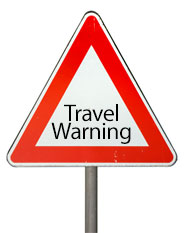Why Study in Italy?
December 23rd, 2013 by Ross Mason What is not to love about Italy? The food, the wine, the incredible countryside – the list goes on and on! It is also a destination of growing importance for international students as the number of international students studying in Italy has rocketed in the past 10 years. In the last 10 years alone, it has grown over 121% to just over 60,000 students who are from a foreign country – with over half coming from non-EU countries.
What is not to love about Italy? The food, the wine, the incredible countryside – the list goes on and on! It is also a destination of growing importance for international students as the number of international students studying in Italy has rocketed in the past 10 years. In the last 10 years alone, it has grown over 121% to just over 60,000 students who are from a foreign country – with over half coming from non-EU countries.
So, why study in Italy?
Cost of Living
One of the major draws for many students is the relatively cheap cost of living compared to other parts of Europe, especially if you select a school that is located outside of a major city. When you couple this with the relatively low cost of food, you can see why students select Italy over countries such as Norway, Sweden, and the UK where typically these costs are much more.
Cultural Immersion
From its famous landmarks, to unique regional and local cuisines and dialects, Italy has such as varied landscape that you will never be bored. It has something to offer all students and if you have the chance to travel the country, you will really see all the differences.
Education System
With 58 State Universities, and many more language center options – Italy has a wide ranging choice that will fit most students. Students will definitely find the right fit for them, and in many cases fluency in Italian is a not a requirement (but it does help).
These are just a few of the reasons why students study in Italy, to learn more about the country and if you plan to travel there don’t forget to pick up adequate Italian international student insurance coverage.
Backpackers Insurance Plans
December 20th, 2013 by Ross Mason With your backpack strapped to your back, no real itinerary set out apart from a vague idea of where you want to go – the thrill of backpacking around the world is second-to-none! The friendships you also make along the way are some of the things that will make the trip what it is, but what you do not want is for something to come along and ruin it all for you. If there is one item therefore that you should take care of before you travel, it is to make sure you have checked out all the best Backpackers Insurance Plans and work out the one that will meet your needs.
With your backpack strapped to your back, no real itinerary set out apart from a vague idea of where you want to go – the thrill of backpacking around the world is second-to-none! The friendships you also make along the way are some of the things that will make the trip what it is, but what you do not want is for something to come along and ruin it all for you. If there is one item therefore that you should take care of before you travel, it is to make sure you have checked out all the best Backpackers Insurance Plans and work out the one that will meet your needs.
As a traveler myself, there is nothing worse than getting sick or injuring when you are abroad. You are outside of your comfort zone, in a strange and foreign land – and the last thing you want to be doing is lying in bed. That is why it is so important to make sure you buy an insurance plan that will help you in the event something happens medically. There are many great insurance plans out there for backpackers, however some of them focus on the wrong benefits – trip cancellation, lost/stolen items, travel delay, missed departure, etc… The list goes on, and while they are excellent benefits to have, sometimes the more important benefits are the ones that get you help when you are sick or injured, when you really need help.
So here are a few things to consider:
Medical Care
Medical cover is the number 1 benefit you will want to make sure is rock solid! Not only should this cover hospitalization and doctors visits, but also medical evacuation (in case you are in a place where you need to be evacuated quickly), repatriation (in case the worst happens) and even emergency reunion (to bring your family to your bedside if you are hospitalized). Without these benefits, if you do get sick or injured you could be stuck without the benefits you need and could be having to pay for these things yourself.
Emergency Assistance
There is nothing worse that being abroad and trying to navigate a healthcare system where you have no idea how it is meant to work. Therefore access to an emergency assistance team 24 hours a team, ideally with toll free access around the world will really make the difference for you. They should be able to refer you to local providers and in some cases make all necessary arrangements for you to visit a provider. Having that helping hand is sometimes really useful!
Provider Payments
In some cases, it may be easier to just pay a provider and submit a claim form – but what if that bill gets too large? Will your insurance provider pay a provider direct? What are their threshold limits to do this? If an insurance plan will not pay a provider direct, it could leave you in hot water if you cannot pay them yourself. Therefore it’s always good to make sure your plan will work with providers around the world, and to see if there is a worldwide network they can tap into. Without this, you could be looking for a doctor yourself, and hope they can speak English!
The best advice is to always look at the insurance fine print and to work out what benefits are most important to you and if you are looking for a solid travel health insurance plan, the Atlas Travel is a great product, offering up to $1,000,000 in coverage with some hazardous/extreme sports included without any extra charge.
F1 Visa Students Have Work Opportunities Too
December 16th, 2013 by Victoria TroupeCollege is expensive. It’s no secret, and many students find themselves working at least part-time to finance their education and living expenses. But working during college is not just about making money, it’s also about building a resume and gaining first-hand experience in your field of study. International students have even fewer options when they find themselves with empty pockets and an entry-level resume. But there are options for international students too!
As an F1 visa holder, you are considered an academic student in the US. You must maintain full-time status at an accredited university, college, or other academic institution that is authorized to accept international students. F-1 students are allowed to accept on-campus jobs, with certain restrictions and regulations, but are not allowed to work off-campus, like a typical US student can, during the first year of their academics. After the first year, your international office and the Department of Homeland Security can grant special permission for you to work off-campus. There are three program options that a student can apply for for off-campus work:
Curricular Practical Training (CPT)
What is CPT? Check out this descriptive CPT article for more information.
Optional Practical Training (OPT) (pre-completion or post-completion)
What is OPT? Check out this descriptive OPT article for more information.
Science, Technology, Engineering, and Mathematics (STEM) Optional Practical Training Extension (OPT)
Graduates in the STEM fields – science, technology, engineering and mathematics – can apply to extend their OPT for an additional 17 months to increase their hands-on education. In this case, the total time available for post-graduation OPT can be up to 29 months.
All of these programs require your job to related directly to your area of study. Working off-campus without one of these three types of special permission is a huge violation of your F-1 visa and could result in the revocation of your visa. InternationalStudent.com has put together a comprehensive resource regarding this topic. Check out their Working in the US section for more information on eligibility and applying for these work opportunities.
Read more about OPT and CPT health insurance options
Keep in mind that it is crucial to have health insurance while in the USA to protect you from any unexpected illnesses or accidents while abroad. We offer student health insurance plans perfect for your F1 visa status:
Friday the 13th – International Superstitious Dates
December 13th, 2013 by Jennifer Frankel Every US child knows to be careful of Friday the 13th. Ever since the 19th century, Friday the 13th has been a source of superstition. Several theories have been proposed concerning the origin of the Friday the 13th superstition, including the theory that it combines two already existing superstitions: that 13 is an unlucky number and that Friday is an unlucky day.
Every US child knows to be careful of Friday the 13th. Ever since the 19th century, Friday the 13th has been a source of superstition. Several theories have been proposed concerning the origin of the Friday the 13th superstition, including the theory that it combines two already existing superstitions: that 13 is an unlucky number and that Friday is an unlucky day.
Though no one is quite sure of its origin, its impact is quite evident. Many people will purposely avoid doing anything significant—such as business meetings, socials, banquets, etc. — due to the belief that the day is cursed and will bring about ill fortune.
The idea of superstitious dates is not limited to the US, although the unlucky day varies according to different cultures. For example, in Italy it is not Friday the 13th, but Friday the 17th that is considered unlucky. In Italian culture, the number 17 is thought to be unlucky, because when it is viewed as the Roman numeral XVII, and then changed anagrammatically to VIXI, it reminds Italians of the Latin phrase meaning “I have lived,” the perfect tense implying “My life is over.”
Additionally, if Friday the 17th falls in November, that is considered to be the unluckiest day of all, because November 2 is memorial day to the deceased in Italy. When this occurs, November is referred to as “the month of the deceased.”
In Spanish speaking counries, it is not the date but the day that is different. Rather than Friday the 13th, Tuesday the 13th is traditionally unlucky. The Greeks also consider Tuesday (and especially the 13th) an unlucky day. The fall of Constantinople to the Fourth Crusade occurred on Tuesday, April 13, 1204, and the Fall of Constantinople to the Ottomans happened on Tuesday, May 29, 1453. Both events served to strengthen the superstition surrounding Tuesday. In addition, the name of the day in Greek is Triti (Τρίτη), meaning literally the third (day of the week). This adds weight to the superstition, as bad luck is said to come in threes.
In India, Friday the 13th is not considered to be unlucky, nor are there any superstitions connected to the number 13. However, Fridays in general are considered to be particularly auspicious days.
In case you were curious, the fear of Friday the 13th is called “friggatriskaidekaphobia” — try saying that five times fast!
Avoid an Epic Fail and Find These Must-Have Insurance Benefits
December 9th, 2013 by Bryanna Davis If this is your first time researching international health insurance, it’s more than likely an overwhelming experience. When searching through the long list of benefits and exclusions, find a plan that has the following must-have insurance benefits:
If this is your first time researching international health insurance, it’s more than likely an overwhelming experience. When searching through the long list of benefits and exclusions, find a plan that has the following must-have insurance benefits:
- Doctor Visits- Even if you are visiting or studying your host country for a short time period, you can still get injured or ill. Keep in mind that you will want to enjoy what time you do have abroad, not spend it counting down the days until you return home so you can visit the doctor.
- Hospitalization- Being hospitalized can quickly result in a high bill. The following instances can easily drain your savings account if you don’t have a plan that covers the must-have insurance benefits:
- Car Crash: $150,000+
- Appendicitis: $60,493
- Fractured Humerus: $47,445
- Fractured Clavicle: $18,393
- Emergency Medical Evacuation- Depending on where you are located, you might not be near a facility that can properly handle your medical emergency. In this instance, it may be necessary to be taken somewhere that is able to treat you. Transportation can be done by ground, but if the distance is far enough it can require a helicopter evacuation. While this option can save your life, it comes with a high price tag.
- Repatriation of Remains- While this benefit isn’t a pleasant one to think about, it’s important to consider when looking at must-have insurance benefits. A repatriation of remains benefit will ensure that your remains are transported home safely in the event of your death.
Keep in mind that this is just a list of must-have benefits to start from. Find a plan that will also meet your own personal needs and any governmental or school benefits you need to have.
Homesick? Here are 5 Ways to Overcome It
December 6th, 2013 by Jennifer Frankel While studying abroad can seem exciting at first, you may realize soon after your arrival that you are distressed and sad about leaving home. After all, everything normal and routine is gone. Your family and friends are far away. And you may find yourself having a more difficult adjustment than you expected. Here are 5 strategies to help you deal with this:
While studying abroad can seem exciting at first, you may realize soon after your arrival that you are distressed and sad about leaving home. After all, everything normal and routine is gone. Your family and friends are far away. And you may find yourself having a more difficult adjustment than you expected. Here are 5 strategies to help you deal with this:
1. Acknowledge Your Feelings
So maybe you think you are invincible? That you can set your mind to anything and achieve it. You know what? You still are and you still can! But in order to be successful, you have to acknowledge your feelings before you are able to do something about it.
2. Get Involved
Many international students report feeling homesick because they do not feel part of the community and they may not have the same support system they have back home. It’s important to take charge, think about what you like to do – and get involved. Many college campuses have a number of organizations and clubs – not to mention activities – going on all of the time. Join clubs, go out (even if you don’t want to!), and start meeting people.
3. Explore Your New Home
Everything may seem foreign – the food, the culture, the surroundings, and what better way to feel comfortable than to hit it straight on? Ask a friend – or someone you just met – to come with you to explore your new city or town. You can even ask someone from the area to go with you. This will allow you to get comfortable and familiar, and perhaps love your new environment!
4. Keep In Touch
Just because there is distance between you and your loved ones, your communication doesn’t have to be. Technology has done wonders, and there are so many tools that can connect you with your family and friends. With Skype, Google Hangout, Facebook, Twitter, Instagram, Google +, and Pinterest, there are plenty of ways to minimize the distance.
5. Talk To Someone
Talking out your feelings and emotions can be very therapeutic. It can be a friend, an advisor, a family member, or someone who can lend an ear. Sometimes we all just need to talk it out and we might already start feeling better.
Want more information? For related articles, check out our article on Culture Shock for International Students.
December 2013 Travel Warnings
December 2nd, 2013 by Ross Mason The December 2013 travel warnings are a listing of any warnings that have been posted by the US Department of State in the month of November, warning travelers who plan to visit those countries. Remember to exercise extra care if you are visiting these countries, and check with your travel insurance provider to make sure you still have coverage in place – sometimes some benefits can be excluded for countries under a travel warning.
The December 2013 travel warnings are a listing of any warnings that have been posted by the US Department of State in the month of November, warning travelers who plan to visit those countries. Remember to exercise extra care if you are visiting these countries, and check with your travel insurance provider to make sure you still have coverage in place – sometimes some benefits can be excluded for countries under a travel warning.
Countries listed through the month of November 2013 include:
Venezuela – November 22nd, 2013
Tens of thousands of foreign visitors safely visit Venezuela each year for study, tourism, business, and volunteer work. However, violent crime in Venezuela is pervasive, both in the capital, Caracas, and in the interior. According to the non-governmental organization Venezuelan Violence Observatory (VVO), there were 21,692 homicides in Venezuela in 2012, amounting to a rate of 73 homicides per 100,000 inhabitants, among the highest in the world. In Caracas, the homicide rate is even higher at 122 homicides per 100,000 inhabitants. Therefore, the Department of State has issued this Travel Warning to inform citizens about the security situation in Venezuela.
Iran – November 21st, 2013
Even though the situation in Iran seems to be improving month-by-month, there are some elements of Iran that still remain very hostile to foreign visitors. As a result, some visitors may be subject to harassment or arrest while traveling or residing in Iran, therefore the Department warns citizens to carefully consider the risks of travel to Iran.
Korea, Democratic People’s Republic of – November 19th, 2013
Travel to North Korea is not routine, and citizens crossing into North Korea, even accidentally, have been subject to arbitrary arrest and long-term detention. Since January 2009, four U.S. citizens have been arrested for entering North Korea illegally, and two U.S. citizens who entered on valid DPRK visas were arrested inside North Korea on other charges. Because of this threat, travel is therefore not advised to this region.
Eritrea – November 18th, 2013
The Eritrean government continues to restrict the travel of all foreign nationals and these restrictions require all visitors and residents, including diplomats (who must apply 10 days in advance) for permission to travel outside Asmara’s city limits. Therefore, because embassy access is limited to the city limits, their ability to provide support is also limited and thus travel is not advised at this time.
Central African Republic – November 14th, 2013
The Department of State warns against all travel to the Central African Republic (CAR) and recommends that those who remain in CAR depart immediately by taking advantage of existing commercial flights. Those who have decided to stay in CAR despite this warning should review their personal security situation and seriously consider departing.
Egypt – November 6th, 2013
Political unrest, which intensified prior to the constitutional referendum in December 2012, the anniversary in 2013 of Egypt’s 25th January Revolution, and the July 2013 change of government, shows little sign of abating. Demonstrations have, on numerous occasions, degenerated into violent clashes between security forces and protesters, and between protesters supporting different factions, resulting in deaths, injuries, and extensive property damage. For this reason, it is advised to defer all travel to Egypt until the situation improves.
While traveling, please keep these travel warnings in mind. Travelers are also advised to enroll through the U.S. Department of State’s Smart Traveler Enrollment Program (STEP) to stay up to date on travel security information.
Thanksgiving Holiday Travel Insurance – Do I need it?
November 26th, 2013 by Ross Mason
For new international students in the USA, this week marks probably the first major holiday in your calendar with Thanksgiving. To many students, this will be a totally new event and you may not have celebrated it before, but in short its a big deal in the USA. Some would even say that Thanksgiving is bigger than Christmas, but to get all the low-down on the holiday we suggest you check out this excellent blog post on our sister site InternationalStudent.com.
So now that you know more about the holiday, you will have probably also noticed that most things will close down (including school) and for some students it can be an excellent time to travel around, either in the USA or abroad.
Whenever you travel abroad, you need to make sure you have the right travel insurance protection. For example if you are from Europe, you have most likely traveled through Europe before and with the EHIC, you can often obtain health care via a reciprocal agreement with your home country. While advisable to always purchase more protection, you have the basic medical needs taken care of. In the USA, because these type of agreements do not exist you will need to make sure you are fully covered when you travel abroad – either to Canada, Mexico or in fact anywhere abroad.
However, if you have an international student health insurance plan you will most likely find that they will cover you abroad not only during your time in the USA, but other countries too. For example, our two most popular plans (Student Secure and Atlas Travel) will cover you anywhere in the world outside of your home country. So you can travel abroad during your stay in the USA and still be covered.
So in short, in most cases you will not need to purchase travel insurance if you do go abroad during the holiday period – but always check with your insurance provider first as plans do vary!
Happy Thanksgiving!
New European Travel Insurance Plan
November 22nd, 2013 by Ross Mason
Since launching our first Euro based travel product over a year ago, the response and feedback from clients has been overwhelming positive that there are more travel options for them to choose from – either for those that are traveling from Europe and are used to € Euro benefits and pricing, or from those that are planning to travel to European countries. We are therefore proud to launch our new Europe Travel Insurance plan, with even more choice for our customers.
The new product offers all this and more:
- Pricing for Europe Only Travel, Worldwide excluding the USA and Worldwide including the USA
- Single Trip Basic Plan, Single Trip Platinum Plan and Multi-Trip Plan Options
- Available to quote in € Euro, £ GBP and $ USD
- Up to 8 policy maximum options
- Up to 9 excess options
- Renewable for up to 2 or 3 years
Of course, the plan benefits are also there to match – including coverage for doctors visits, hospitalization, intensive care treatment, emergency local ambulance, evacuation and repatriation. To view the full plan benefits, please either visit the benefits page or download a copy of the brochure for more information.
The new European Travel Insurance plan is better than ever – so please consider it the next time you travel abroad!

